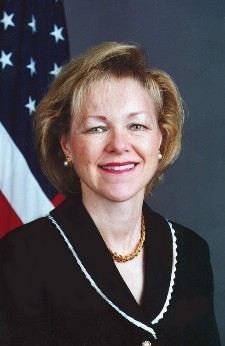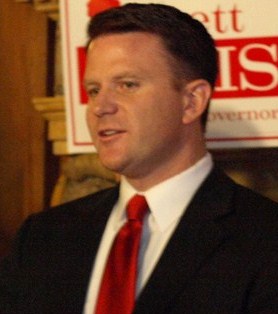Related Research Articles

In the United States, Medicaid is a government program that provides health insurance for adults and children with limited income and resources. The program is partially funded and primarily managed by state governments, which also have wide latitude in determining eligibility and benefits, but the federal government sets baseline standards for state Medicaid programs and provides a significant portion of their funding.

Tommy George Thompson is an American politician from Juneau County, Wisconsin. He served as the 19th United States secretary of Health and Human Services from 2001 to 2005 in the cabinet of President George W. Bush. Before that, he was the 42nd governor of Wisconsin (1987–2001) and Republican floor leader in the Wisconsin State Assembly (1981–1987).

The Children's Health Insurance Program (CHIP) – formerly known as the State Children's Health Insurance Program (SCHIP) – is a program administered by the United States Department of Health and Human Services that provides matching funds to states for health insurance to families with children. The program was designed to cover uninsured children in families with incomes that are modest but too high to qualify for Medicaid. The program was passed into law as part of the Balanced Budget Act of 1997, and the statutory authority for CHIP is under title XXI of the Social Security Act.

William Asa Hutchinson II is an American attorney, businessman, and politician who served as the 46th governor of Arkansas from 2015 to 2023. A member of the Republican Party, he previously served as a U.S. attorney, U.S. representative, and in two roles in the George W. Bush administration. He was a candidate for the 2024 Republican presidential nomination.

Scott Kevin Walker is an American politician who served as the 45th governor of Wisconsin from 2011 to 2019. A member of the Republican Party, he previously served as Milwaukee County executive from 2002 to 2010.

Aldona Zofia Wos is a Polish-American former physician and Republican politician who served in various positions at several government agencies under Presidents George W. Bush and Donald Trump and nonprofit organizations. She was the United States Ambassador to Estonia from 2004 until early December 2006, the fifth since the country regained its independence in 1991. From 2013 until 2015, she was Secretary of the North Carolina Department of Health and Human Services. From 2017 to 2021, Wos served as vice-chairwoman of the President's Commission on White House Fellowships, which is tasked with reviewing candidates for White House fellowships.

Brett H. Davis is an American businessman and former Republican politician. He served three terms in the Wisconsin State Assembly, representing the 80th Assembly district, and subsequently served as Wisconsin's state Medicaid director from 2011 to 2014.
BadgerCare Plus, known informally as BadgerCare, is a public healthcare coverage program for low-income Wisconsin residents created by former governor Tommy Thompson and modified by former governor Jim Doyle. The Wisconsin Department of Health Services oversees the program's implementation.
Kitty Rhoades was an American politician. She served as a member of the Wisconsin State Assembly, where she represented the 30th district, before serving as Secretary of the Wisconsin Department of Health Services.
The cabinet of Governor of New York David Paterson consists of the executive chamber, and the heads of the various departments of the Government of New York. On Paterson's first day as governor, he asked for letters of resignation from all of the top staff members and state agency commissioners appointed by previous Governor Eliot Spitzer. This typical action does not mean the holdovers from the Spitzer administration will be replaced, and Paterson said that "having the letters gives him the flexibility to make changes if he decides to".

The Arkansas Department of Human Services (DHS) is a state agency of Arkansas, headquartered in Donaghey Plaza South of the Donaghey Complex, a five-story building on the southwest corner of Main Street and 7th Street, in Little Rock.

2011 Wisconsin Act 10, also known as the Wisconsin Budget Repair Bill or the Wisconsin Budget Adjustment Act, is a controversial law enacted by the 100th Wisconsin Legislature which significantly limited the rights and compensation of state and local government employees in Wisconsin. It was the signature act of Republican governor Scott Walker, who described it as a tool needed to address a projected $3.6 billion budget deficit. The introduction of this bill provoked immediate outrage from labor unions and their allies, and resulted in months of mass protests at the Wisconsin State Capitol. Democratic members of the Wisconsin Senate then fled the state to deny a quorum for the bill, remaining in Illinois for three weeks. Republicans in the legislature eventually stripped out budgetary items to circumvent budget-related quorum rules and passed the legislation on March 9, 2011. The law was signed by governor Walker on the morning of March 11 and was followed by a ceremonial signing later that day.

Anthony Steven Evers is an American educator and politician serving as the 46th governor of Wisconsin since 2019. A member of the Democratic Party, he served as Wisconsin's Superintendent of Public Instruction from 2009 to 2019.
Joseph S. "Joe" Leean is an American businessman and retired Republican politician. He served as Secretary of the Wisconsin Department of Health and Family Services for seven years under Governor Tommy Thompson and was instrumental in the creation of BadgerCare, Wisconsin's state health insurance program.
Abortion is the termination of human pregnancy, often performed in the first 28 weeks of pregnancy. In 1973, the United States Supreme Court in Roe v. Wade recognized a constitutional right to obtain an abortion without excessive government restriction, and in 1992 the Court in Planned Parenthood v. Casey invalidated restrictions that create an undue burden on people seeking abortions. Since then, there has continued to be an abortion debate in the United States, and some states have passed laws in the form of regulation of abortions but which have the purpose or effect of restricting its provision. The proponents of such laws argue they do not create an undue burden. Some state laws that impact the availability of abortions have been upheld by courts. In 2022, Roe and Casey were overturned by the Supreme Court in Dobbs v. Jackson Women's Health Organization, meaning that states may now regulate abortion in ways that were not previously permitted.

The Wisconsin Department of Health Services (WisDHS) is a governmental agency of the U.S. state of Wisconsin responsible for maintaining public health. It administers a wide range of services in the state and at state institutions, regulates hospitals and care providers, and supervises and consults with local public health agencies. Its responsibilities include public health; mental health and substance abuse; long-term support and care; services to people with disabilities, medical assistance, and children’s services; aging programs; physical and developmental disability services; blindness disability programs; operation of care and treatment facilities; quality assurance programs; nutrition supplementation programs; medical assistance; and health care for low-income families, elderly, and the disabled.
The Dr. Nathan Davis Awards are presented annually by the American Medical Association (AMA) and awarded to elected and career public servants in national, state, and local governments for outstanding government service. These awards are named for the founder of the American Medical Association, Nathan Smith Davis.

Under the public healthcare policy of the United States, some people have incomes too high to qualify in their state of residence for Medicaid, the public health insurance plan for those with limited resources, but too low to qualify for the premium tax credits that would subsidize the purchase of private health insurance. These people are described as falling into the Medicaid coverage gap.
Mary Mayhew is an American lobbyist, former Maine commissioner of Health and Human Services and candidate for Governor of Maine in 2018. A lobbyist for hospitals prior to her appointment as Commissioner by Republican Governor Paul LePage, Mayhew spent more than six years pursuing conservative welfare policies.

SreyRam Kuy is a Cambodian American surgeon, writer, researcher, and healthcare executive.
References
- ↑ "Dennis Smith, MA". University of Arkansas for Medical Sciences. Retrieved October 18, 2024.
- ↑ "Administration policy would insure fetuses". Lexington Herald-Leader. July 5, 2001. p. 91. Retrieved October 18, 2024– via Newspapers.com.
- ↑ Haislmaier, Edmund; Smith, Dennis G. (December 1, 2009). "Medicaid Meltdown: Dropping Medicaid Could Save States $1 Trillion". The Heritage Foundation . Retrieved October 18, 2024.
- ↑ "Walker's Cabinet". Wisconsin State Journal . December 31, 2010. p. 7. Retrieved October 18, 2024– via Newspapers.com.
- ↑ Murphy, Bruce (October 10, 2013). "The downfall of Dennis Smith". Isthmus . Retrieved October 18, 2024.
- ↑ Brantley, Max (September 2, 2016). "Arkansas hires former Bush Medicaid director". Arkansas Times . Retrieved October 18, 2024.